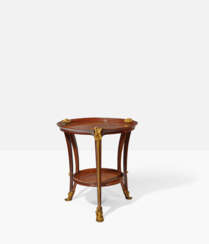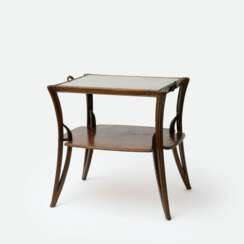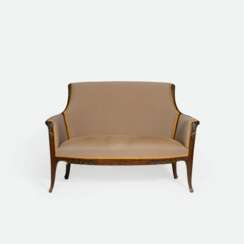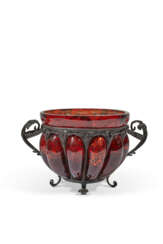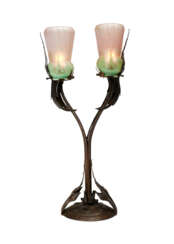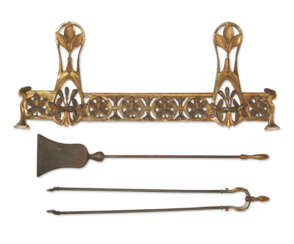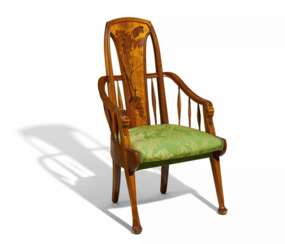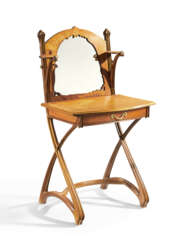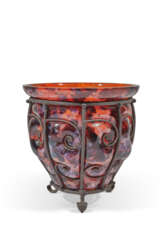луи мажорель (1859 - 1929)

Louis Majorelle was a prominent French artist, cabinetmaker, furniture designer, and a leading figure of the Art Nouveau movement. Trained initially as a painter, Majorelle shifted focus to furniture design, taking over his family's business and emerging as a dynamic force within the École de Nancy.
Louis Majorelle was instrumental in the Art Nouveau style's development, known for his innovative and nature-inspired designs. He was one of the founding members of the École de Nancy, a collective that aimed to promote Lorraine's decorative arts. Louis Majorelle's work, particularly in furniture and interior design, showcased his skill in integrating natural forms with functional pieces. His use of materials such as mahogany and his incorporation of floral and organic motifs were distinctive of his work. Notably, Majorelle's Nénuphar bed, displaying water lily motifs, stands as a testament to his design philosophy and can be seen at the Musée d'Orsay in Paris.
The Villa Majorelle, his own residence in Nancy, serves as an embodiment of Art Nouveau architecture, featuring intricate ironwork and woodwork crafted by Louis Majorelle himself. This house not only served as his home but also as a beacon of Art Nouveau's architectural potential, showcasing the movement's aesthetic in a living environment.
For collectors and experts in art and antiques, Louis Majorelle's work represents the pinnacle of Art Nouveau's embrace of naturalistic designs and the seamless blend of art and craftsmanship. His contributions to the movement have left an indelible mark on the history of decorative arts.
To stay informed about new discoveries and interpretations related to Louis Majorelle and his era, signing up for updates is highly recommended. This subscription will ensure you're alerted to new product sales, auction events, and exhibitions related to this significant figure in art and design history.


Louis Majorelle was a prominent French artist, cabinetmaker, furniture designer, and a leading figure of the Art Nouveau movement. Trained initially as a painter, Majorelle shifted focus to furniture design, taking over his family's business and emerging as a dynamic force within the École de Nancy.
Louis Majorelle was instrumental in the Art Nouveau style's development, known for his innovative and nature-inspired designs. He was one of the founding members of the École de Nancy, a collective that aimed to promote Lorraine's decorative arts. Louis Majorelle's work, particularly in furniture and interior design, showcased his skill in integrating natural forms with functional pieces. His use of materials such as mahogany and his incorporation of floral and organic motifs were distinctive of his work. Notably, Majorelle's Nénuphar bed, displaying water lily motifs, stands as a testament to his design philosophy and can be seen at the Musée d'Orsay in Paris.
The Villa Majorelle, his own residence in Nancy, serves as an embodiment of Art Nouveau architecture, featuring intricate ironwork and woodwork crafted by Louis Majorelle himself. This house not only served as his home but also as a beacon of Art Nouveau's architectural potential, showcasing the movement's aesthetic in a living environment.
For collectors and experts in art and antiques, Louis Majorelle's work represents the pinnacle of Art Nouveau's embrace of naturalistic designs and the seamless blend of art and craftsmanship. His contributions to the movement have left an indelible mark on the history of decorative arts.
To stay informed about new discoveries and interpretations related to Louis Majorelle and his era, signing up for updates is highly recommended. This subscription will ensure you're alerted to new product sales, auction events, and exhibitions related to this significant figure in art and design history.
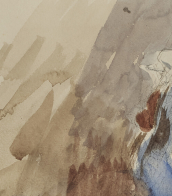

Louis Majorelle was a prominent French artist, cabinetmaker, furniture designer, and a leading figure of the Art Nouveau movement. Trained initially as a painter, Majorelle shifted focus to furniture design, taking over his family's business and emerging as a dynamic force within the École de Nancy.
Louis Majorelle was instrumental in the Art Nouveau style's development, known for his innovative and nature-inspired designs. He was one of the founding members of the École de Nancy, a collective that aimed to promote Lorraine's decorative arts. Louis Majorelle's work, particularly in furniture and interior design, showcased his skill in integrating natural forms with functional pieces. His use of materials such as mahogany and his incorporation of floral and organic motifs were distinctive of his work. Notably, Majorelle's Nénuphar bed, displaying water lily motifs, stands as a testament to his design philosophy and can be seen at the Musée d'Orsay in Paris.
The Villa Majorelle, his own residence in Nancy, serves as an embodiment of Art Nouveau architecture, featuring intricate ironwork and woodwork crafted by Louis Majorelle himself. This house not only served as his home but also as a beacon of Art Nouveau's architectural potential, showcasing the movement's aesthetic in a living environment.
For collectors and experts in art and antiques, Louis Majorelle's work represents the pinnacle of Art Nouveau's embrace of naturalistic designs and the seamless blend of art and craftsmanship. His contributions to the movement have left an indelible mark on the history of decorative arts.
To stay informed about new discoveries and interpretations related to Louis Majorelle and his era, signing up for updates is highly recommended. This subscription will ensure you're alerted to new product sales, auction events, and exhibitions related to this significant figure in art and design history.


Louis Majorelle was a prominent French artist, cabinetmaker, furniture designer, and a leading figure of the Art Nouveau movement. Trained initially as a painter, Majorelle shifted focus to furniture design, taking over his family's business and emerging as a dynamic force within the École de Nancy.
Louis Majorelle was instrumental in the Art Nouveau style's development, known for his innovative and nature-inspired designs. He was one of the founding members of the École de Nancy, a collective that aimed to promote Lorraine's decorative arts. Louis Majorelle's work, particularly in furniture and interior design, showcased his skill in integrating natural forms with functional pieces. His use of materials such as mahogany and his incorporation of floral and organic motifs were distinctive of his work. Notably, Majorelle's Nénuphar bed, displaying water lily motifs, stands as a testament to his design philosophy and can be seen at the Musée d'Orsay in Paris.
The Villa Majorelle, his own residence in Nancy, serves as an embodiment of Art Nouveau architecture, featuring intricate ironwork and woodwork crafted by Louis Majorelle himself. This house not only served as his home but also as a beacon of Art Nouveau's architectural potential, showcasing the movement's aesthetic in a living environment.
For collectors and experts in art and antiques, Louis Majorelle's work represents the pinnacle of Art Nouveau's embrace of naturalistic designs and the seamless blend of art and craftsmanship. His contributions to the movement have left an indelible mark on the history of decorative arts.
To stay informed about new discoveries and interpretations related to Louis Majorelle and his era, signing up for updates is highly recommended. This subscription will ensure you're alerted to new product sales, auction events, and exhibitions related to this significant figure in art and design history.


Louis Majorelle was a prominent French artist, cabinetmaker, furniture designer, and a leading figure of the Art Nouveau movement. Trained initially as a painter, Majorelle shifted focus to furniture design, taking over his family's business and emerging as a dynamic force within the École de Nancy.
Louis Majorelle was instrumental in the Art Nouveau style's development, known for his innovative and nature-inspired designs. He was one of the founding members of the École de Nancy, a collective that aimed to promote Lorraine's decorative arts. Louis Majorelle's work, particularly in furniture and interior design, showcased his skill in integrating natural forms with functional pieces. His use of materials such as mahogany and his incorporation of floral and organic motifs were distinctive of his work. Notably, Majorelle's Nénuphar bed, displaying water lily motifs, stands as a testament to his design philosophy and can be seen at the Musée d'Orsay in Paris.
The Villa Majorelle, his own residence in Nancy, serves as an embodiment of Art Nouveau architecture, featuring intricate ironwork and woodwork crafted by Louis Majorelle himself. This house not only served as his home but also as a beacon of Art Nouveau's architectural potential, showcasing the movement's aesthetic in a living environment.
For collectors and experts in art and antiques, Louis Majorelle's work represents the pinnacle of Art Nouveau's embrace of naturalistic designs and the seamless blend of art and craftsmanship. His contributions to the movement have left an indelible mark on the history of decorative arts.
To stay informed about new discoveries and interpretations related to Louis Majorelle and his era, signing up for updates is highly recommended. This subscription will ensure you're alerted to new product sales, auction events, and exhibitions related to this significant figure in art and design history.


Louis Majorelle was a prominent French artist, cabinetmaker, furniture designer, and a leading figure of the Art Nouveau movement. Trained initially as a painter, Majorelle shifted focus to furniture design, taking over his family's business and emerging as a dynamic force within the École de Nancy.
Louis Majorelle was instrumental in the Art Nouveau style's development, known for his innovative and nature-inspired designs. He was one of the founding members of the École de Nancy, a collective that aimed to promote Lorraine's decorative arts. Louis Majorelle's work, particularly in furniture and interior design, showcased his skill in integrating natural forms with functional pieces. His use of materials such as mahogany and his incorporation of floral and organic motifs were distinctive of his work. Notably, Majorelle's Nénuphar bed, displaying water lily motifs, stands as a testament to his design philosophy and can be seen at the Musée d'Orsay in Paris.
The Villa Majorelle, his own residence in Nancy, serves as an embodiment of Art Nouveau architecture, featuring intricate ironwork and woodwork crafted by Louis Majorelle himself. This house not only served as his home but also as a beacon of Art Nouveau's architectural potential, showcasing the movement's aesthetic in a living environment.
For collectors and experts in art and antiques, Louis Majorelle's work represents the pinnacle of Art Nouveau's embrace of naturalistic designs and the seamless blend of art and craftsmanship. His contributions to the movement have left an indelible mark on the history of decorative arts.
To stay informed about new discoveries and interpretations related to Louis Majorelle and his era, signing up for updates is highly recommended. This subscription will ensure you're alerted to new product sales, auction events, and exhibitions related to this significant figure in art and design history.
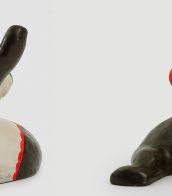

Louis Majorelle was a prominent French artist, cabinetmaker, furniture designer, and a leading figure of the Art Nouveau movement. Trained initially as a painter, Majorelle shifted focus to furniture design, taking over his family's business and emerging as a dynamic force within the École de Nancy.
Louis Majorelle was instrumental in the Art Nouveau style's development, known for his innovative and nature-inspired designs. He was one of the founding members of the École de Nancy, a collective that aimed to promote Lorraine's decorative arts. Louis Majorelle's work, particularly in furniture and interior design, showcased his skill in integrating natural forms with functional pieces. His use of materials such as mahogany and his incorporation of floral and organic motifs were distinctive of his work. Notably, Majorelle's Nénuphar bed, displaying water lily motifs, stands as a testament to his design philosophy and can be seen at the Musée d'Orsay in Paris.
The Villa Majorelle, his own residence in Nancy, serves as an embodiment of Art Nouveau architecture, featuring intricate ironwork and woodwork crafted by Louis Majorelle himself. This house not only served as his home but also as a beacon of Art Nouveau's architectural potential, showcasing the movement's aesthetic in a living environment.
For collectors and experts in art and antiques, Louis Majorelle's work represents the pinnacle of Art Nouveau's embrace of naturalistic designs and the seamless blend of art and craftsmanship. His contributions to the movement have left an indelible mark on the history of decorative arts.
To stay informed about new discoveries and interpretations related to Louis Majorelle and his era, signing up for updates is highly recommended. This subscription will ensure you're alerted to new product sales, auction events, and exhibitions related to this significant figure in art and design history.


Louis Majorelle was a prominent French artist, cabinetmaker, furniture designer, and a leading figure of the Art Nouveau movement. Trained initially as a painter, Majorelle shifted focus to furniture design, taking over his family's business and emerging as a dynamic force within the École de Nancy.
Louis Majorelle was instrumental in the Art Nouveau style's development, known for his innovative and nature-inspired designs. He was one of the founding members of the École de Nancy, a collective that aimed to promote Lorraine's decorative arts. Louis Majorelle's work, particularly in furniture and interior design, showcased his skill in integrating natural forms with functional pieces. His use of materials such as mahogany and his incorporation of floral and organic motifs were distinctive of his work. Notably, Majorelle's Nénuphar bed, displaying water lily motifs, stands as a testament to his design philosophy and can be seen at the Musée d'Orsay in Paris.
The Villa Majorelle, his own residence in Nancy, serves as an embodiment of Art Nouveau architecture, featuring intricate ironwork and woodwork crafted by Louis Majorelle himself. This house not only served as his home but also as a beacon of Art Nouveau's architectural potential, showcasing the movement's aesthetic in a living environment.
For collectors and experts in art and antiques, Louis Majorelle's work represents the pinnacle of Art Nouveau's embrace of naturalistic designs and the seamless blend of art and craftsmanship. His contributions to the movement have left an indelible mark on the history of decorative arts.
To stay informed about new discoveries and interpretations related to Louis Majorelle and his era, signing up for updates is highly recommended. This subscription will ensure you're alerted to new product sales, auction events, and exhibitions related to this significant figure in art and design history.
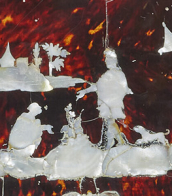

Louis Majorelle was a prominent French artist, cabinetmaker, furniture designer, and a leading figure of the Art Nouveau movement. Trained initially as a painter, Majorelle shifted focus to furniture design, taking over his family's business and emerging as a dynamic force within the École de Nancy.
Louis Majorelle was instrumental in the Art Nouveau style's development, known for his innovative and nature-inspired designs. He was one of the founding members of the École de Nancy, a collective that aimed to promote Lorraine's decorative arts. Louis Majorelle's work, particularly in furniture and interior design, showcased his skill in integrating natural forms with functional pieces. His use of materials such as mahogany and his incorporation of floral and organic motifs were distinctive of his work. Notably, Majorelle's Nénuphar bed, displaying water lily motifs, stands as a testament to his design philosophy and can be seen at the Musée d'Orsay in Paris.
The Villa Majorelle, his own residence in Nancy, serves as an embodiment of Art Nouveau architecture, featuring intricate ironwork and woodwork crafted by Louis Majorelle himself. This house not only served as his home but also as a beacon of Art Nouveau's architectural potential, showcasing the movement's aesthetic in a living environment.
For collectors and experts in art and antiques, Louis Majorelle's work represents the pinnacle of Art Nouveau's embrace of naturalistic designs and the seamless blend of art and craftsmanship. His contributions to the movement have left an indelible mark on the history of decorative arts.
To stay informed about new discoveries and interpretations related to Louis Majorelle and his era, signing up for updates is highly recommended. This subscription will ensure you're alerted to new product sales, auction events, and exhibitions related to this significant figure in art and design history.
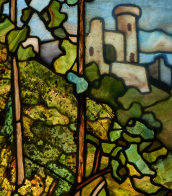

Louis Majorelle was a prominent French artist, cabinetmaker, furniture designer, and a leading figure of the Art Nouveau movement. Trained initially as a painter, Majorelle shifted focus to furniture design, taking over his family's business and emerging as a dynamic force within the École de Nancy.
Louis Majorelle was instrumental in the Art Nouveau style's development, known for his innovative and nature-inspired designs. He was one of the founding members of the École de Nancy, a collective that aimed to promote Lorraine's decorative arts. Louis Majorelle's work, particularly in furniture and interior design, showcased his skill in integrating natural forms with functional pieces. His use of materials such as mahogany and his incorporation of floral and organic motifs were distinctive of his work. Notably, Majorelle's Nénuphar bed, displaying water lily motifs, stands as a testament to his design philosophy and can be seen at the Musée d'Orsay in Paris.
The Villa Majorelle, his own residence in Nancy, serves as an embodiment of Art Nouveau architecture, featuring intricate ironwork and woodwork crafted by Louis Majorelle himself. This house not only served as his home but also as a beacon of Art Nouveau's architectural potential, showcasing the movement's aesthetic in a living environment.
For collectors and experts in art and antiques, Louis Majorelle's work represents the pinnacle of Art Nouveau's embrace of naturalistic designs and the seamless blend of art and craftsmanship. His contributions to the movement have left an indelible mark on the history of decorative arts.
To stay informed about new discoveries and interpretations related to Louis Majorelle and his era, signing up for updates is highly recommended. This subscription will ensure you're alerted to new product sales, auction events, and exhibitions related to this significant figure in art and design history.


Louis Majorelle was a prominent French artist, cabinetmaker, furniture designer, and a leading figure of the Art Nouveau movement. Trained initially as a painter, Majorelle shifted focus to furniture design, taking over his family's business and emerging as a dynamic force within the École de Nancy.
Louis Majorelle was instrumental in the Art Nouveau style's development, known for his innovative and nature-inspired designs. He was one of the founding members of the École de Nancy, a collective that aimed to promote Lorraine's decorative arts. Louis Majorelle's work, particularly in furniture and interior design, showcased his skill in integrating natural forms with functional pieces. His use of materials such as mahogany and his incorporation of floral and organic motifs were distinctive of his work. Notably, Majorelle's Nénuphar bed, displaying water lily motifs, stands as a testament to his design philosophy and can be seen at the Musée d'Orsay in Paris.
The Villa Majorelle, his own residence in Nancy, serves as an embodiment of Art Nouveau architecture, featuring intricate ironwork and woodwork crafted by Louis Majorelle himself. This house not only served as his home but also as a beacon of Art Nouveau's architectural potential, showcasing the movement's aesthetic in a living environment.
For collectors and experts in art and antiques, Louis Majorelle's work represents the pinnacle of Art Nouveau's embrace of naturalistic designs and the seamless blend of art and craftsmanship. His contributions to the movement have left an indelible mark on the history of decorative arts.
To stay informed about new discoveries and interpretations related to Louis Majorelle and his era, signing up for updates is highly recommended. This subscription will ensure you're alerted to new product sales, auction events, and exhibitions related to this significant figure in art and design history.
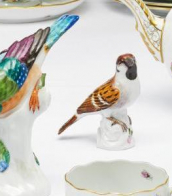

Louis Majorelle was a prominent French artist, cabinetmaker, furniture designer, and a leading figure of the Art Nouveau movement. Trained initially as a painter, Majorelle shifted focus to furniture design, taking over his family's business and emerging as a dynamic force within the École de Nancy.
Louis Majorelle was instrumental in the Art Nouveau style's development, known for his innovative and nature-inspired designs. He was one of the founding members of the École de Nancy, a collective that aimed to promote Lorraine's decorative arts. Louis Majorelle's work, particularly in furniture and interior design, showcased his skill in integrating natural forms with functional pieces. His use of materials such as mahogany and his incorporation of floral and organic motifs were distinctive of his work. Notably, Majorelle's Nénuphar bed, displaying water lily motifs, stands as a testament to his design philosophy and can be seen at the Musée d'Orsay in Paris.
The Villa Majorelle, his own residence in Nancy, serves as an embodiment of Art Nouveau architecture, featuring intricate ironwork and woodwork crafted by Louis Majorelle himself. This house not only served as his home but also as a beacon of Art Nouveau's architectural potential, showcasing the movement's aesthetic in a living environment.
For collectors and experts in art and antiques, Louis Majorelle's work represents the pinnacle of Art Nouveau's embrace of naturalistic designs and the seamless blend of art and craftsmanship. His contributions to the movement have left an indelible mark on the history of decorative arts.
To stay informed about new discoveries and interpretations related to Louis Majorelle and his era, signing up for updates is highly recommended. This subscription will ensure you're alerted to new product sales, auction events, and exhibitions related to this significant figure in art and design history.
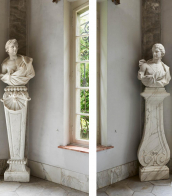

Louis Majorelle was a prominent French artist, cabinetmaker, furniture designer, and a leading figure of the Art Nouveau movement. Trained initially as a painter, Majorelle shifted focus to furniture design, taking over his family's business and emerging as a dynamic force within the École de Nancy.
Louis Majorelle was instrumental in the Art Nouveau style's development, known for his innovative and nature-inspired designs. He was one of the founding members of the École de Nancy, a collective that aimed to promote Lorraine's decorative arts. Louis Majorelle's work, particularly in furniture and interior design, showcased his skill in integrating natural forms with functional pieces. His use of materials such as mahogany and his incorporation of floral and organic motifs were distinctive of his work. Notably, Majorelle's Nénuphar bed, displaying water lily motifs, stands as a testament to his design philosophy and can be seen at the Musée d'Orsay in Paris.
The Villa Majorelle, his own residence in Nancy, serves as an embodiment of Art Nouveau architecture, featuring intricate ironwork and woodwork crafted by Louis Majorelle himself. This house not only served as his home but also as a beacon of Art Nouveau's architectural potential, showcasing the movement's aesthetic in a living environment.
For collectors and experts in art and antiques, Louis Majorelle's work represents the pinnacle of Art Nouveau's embrace of naturalistic designs and the seamless blend of art and craftsmanship. His contributions to the movement have left an indelible mark on the history of decorative arts.
To stay informed about new discoveries and interpretations related to Louis Majorelle and his era, signing up for updates is highly recommended. This subscription will ensure you're alerted to new product sales, auction events, and exhibitions related to this significant figure in art and design history.





